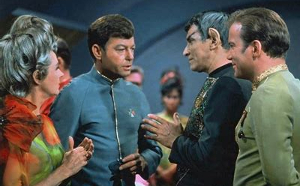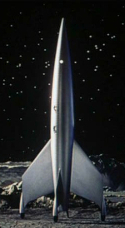Desperately Seeking E.T.
A Peculiar Sort of Hype
Wednesday, May 29, 2019 11:44 am
In a lecture in October of 2015, Dr. Carolyn Porco, Imaging Team Leader for the Cassini Mission to Saturn, said, regarding the chance of life on Enceladus:
Should we ever make such a discovery, if we ever, anywhere, find that there has been a second, independent genesis in our Solar System, then I think that at that point the spell is broken. The existence theorem has been proven. And we could safely infer from that, that life is commonplace; that it is not a bug but a feature of the universe in which we live and that it has occurred a staggering number of times throughout the 13.7 billion years of the history of the cosmos. And I think that that might be the kind of discovery that could change a great many things.Maybe I'm just curmudgeonly contrarian, but the discovery of extraterrestrial life would not impress me.
Well-Ordered Star Trek
 Of course I like Star Trek. I was only three when it first aired, so I didn't see it until it was in syndication and I was nearly ten; but from early on I was a genuine fan. I knew all the episodes. I built models of the ships. I read (and still possess) the paperback adaptations by James Blish. I even bought fold-out technical plans of the Enterprise.
Of course I like Star Trek. I was only three when it first aired, so I didn't see it until it was in syndication and I was nearly ten; but from early on I was a genuine fan. I knew all the episodes. I built models of the ships. I read (and still possess) the paperback adaptations by James Blish. I even bought fold-out technical plans of the Enterprise.
I was never a Trekkie, however; never deep in the lore.
Revisiting an Old Friend
Wednesday, May 22, 2019 3:45 pm

I was never a Trekkie, however; never deep in the lore.
A Half-Happy Year?
News of Story Submissions
Thursday, May 9, 2019 12:46 pm
Due a Hanging, my sequel to Some Things Missing From Her Profile, has been accepted by StoryHack. Biggest thanks to Bryce Beattie, the discerning and wise editor. The story will appear in StoryHack #6, later this year or early next. This acceptance really pleases me.
As far as I know, my story in Planetary Pluto is still happening. No word since February, however. Aargh. My submission to Planetary Luna was foolishly rejected.
My story for the asteroid anthology was also rejected. That surprised me. The editor's reasoning was valid enough, but I'd say he was overthinking things. His loss.
Now, if I had to have only one acceptance this year, Due a Hanging in StoryHack would have been my choice. So despite the disappointments, the year may turn out happy enough.
And the year isn't done, anyhow. Submissions to Stupefying Stories have re-opened. I have submitted a story. If that one gets rejected, I have two others. I like Stupefying Stories. I hope I get in.
P.S. Since I have had good luck with Hamlin Becker and StoryHack, I am definitely going to write a third story in time for the next round of submissions, which will presumably be around December. This story will be my next project.
As far as I know, my story in Planetary Pluto is still happening. No word since February, however. Aargh. My submission to Planetary Luna was foolishly rejected.
My story for the asteroid anthology was also rejected. That surprised me. The editor's reasoning was valid enough, but I'd say he was overthinking things. His loss.
Now, if I had to have only one acceptance this year, Due a Hanging in StoryHack would have been my choice. So despite the disappointments, the year may turn out happy enough.
And the year isn't done, anyhow. Submissions to Stupefying Stories have re-opened. I have submitted a story. If that one gets rejected, I have two others. I like Stupefying Stories. I hope I get in.
P.S. Since I have had good luck with Hamlin Becker and StoryHack, I am definitely going to write a third story in time for the next round of submissions, which will presumably be around December. This story will be my next project.
Long Time Coming
A Lunar Excursion Module is not a rocketship.
An Unexpected Sight
Sunday, April 28, 2019 3:29 pm
 | Rocketships are romance. However grounded they were in speculative engineering, rocketships were ultimately acts of art. They were unreal transports to a heaven closer than God’s. They were graceful. Hopeful. Evocative. |
Am I Capricious?
Just File Under "Never Mind"
Tuesday, April 23, 2019 4:06 pm
Many months ago I modified my story The Spare Midge to make its ending less grim. I even explained my thinking in a post. A while later I read the modified version and decided it did betray the original and, moreover, fell flat. So I have restored the original ending.
In general I decided to accept the grimness of my earlier works. To that end, I also removed a couple of distracting things from The Spare Midge collection, which is now tighter and more tonally consistent.
Indeed I even put my grimmest story, The Amputated Man, into my other collection The Chicken Bone. I have always found this story rather cruel; yet it seems to me to be effective, too. It definitely darkens the collection. It also seems to fit.
I am done fussing with my earlier works.
P.S. The Endless Batteries was removed from The Spare Midge and restored to its original form as a chapterbook. I have not published this on Amazon or the like. I probably won't. But for the sake of my oeuvre, it is now as it should be.
In general I decided to accept the grimness of my earlier works. To that end, I also removed a couple of distracting things from The Spare Midge collection, which is now tighter and more tonally consistent.
Indeed I even put my grimmest story, The Amputated Man, into my other collection The Chicken Bone. I have always found this story rather cruel; yet it seems to me to be effective, too. It definitely darkens the collection. It also seems to fit.
I am done fussing with my earlier works.
P.S. The Endless Batteries was removed from The Spare Midge and restored to its original form as a chapterbook. I have not published this on Amazon or the like. I probably won't. But for the sake of my oeuvre, it is now as it should be.
Whence Then Hath It Cockle?
An Insight Into Theodicy
Thursday, March 7, 2019 10:00 pm
I'm not put out by the existence of evil. That is, I do not think it is some sort of terrible mystery, nor a thing to make one doubt the existence of God. You have heard it said: "A truly good God would never allow this! So there is no good God; indeed, no God at all." But that is not an argument. It is a kind of tantrum, really.
Now at Periblogion
Soon I Will Orbit Away Again
Monday, March 4, 2019 4:16 am
So, I wrote a sequel to Some Things Missing From Her Profile. I submitted it to StoryHack (which originally published Some Things). I've been trying to write this sequel since 2017. I only finished it twelve hours before submissions closed on January 1st. Since I perfect as I write, only the last few pages were "first draft." A few days later I sent a revision, which was graciously allowed. I am awaiting judgment now.
Then I wrote a story for an SF anthology about asteroids. Submissions for that closed on March 1st. Also awaiting judgment.
Meanwhile, word is that the Pluto anthology, which will include a story of mine, has resumed production. Presumably that means the Luna anthology, to which I also submitted, has also resumed production; but no official word on that, nor on whether my Luna story has even been accepted.
Last fall I submitted a story to Stupefying Stories. It nearly made it. They liked it but couldn't quite fit it in. I am re-submitting when submissions re-open April 1st.
It would make me inordinately happy if all five of these stories got published. I am fairly optimistic about the four that are undecided. I could use a happy year.
Anyhow, I think I'll post a few more things before I resume my negligence of this blog...
Then I wrote a story for an SF anthology about asteroids. Submissions for that closed on March 1st. Also awaiting judgment.
Meanwhile, word is that the Pluto anthology, which will include a story of mine, has resumed production. Presumably that means the Luna anthology, to which I also submitted, has also resumed production; but no official word on that, nor on whether my Luna story has even been accepted.
Last fall I submitted a story to Stupefying Stories. It nearly made it. They liked it but couldn't quite fit it in. I am re-submitting when submissions re-open April 1st.
It would make me inordinately happy if all five of these stories got published. I am fairly optimistic about the four that are undecided. I could use a happy year.
Anyhow, I think I'll post a few more things before I resume my negligence of this blog...
© 2004-26 David Skinner · All rights reserved




